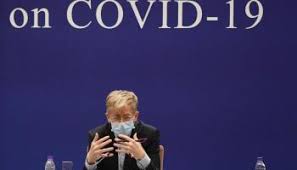Amid growing cases, WHO says COVID-19 containment feasible with right measures

Beijing: As eight more countries confirmed their first cases of COVID-19 on Monday and the caseload has continued to spike in worst-hit regions, the World Health Organization (WHO) urged global actions to contain the epidemic with right measures.
On Monday, Indonesia reported its first confirmed cases. The two Indonesian nationals contacted a Japanese citizen who had traveled in Indonesia and was tested positive in Malaysia, China Economic Net reported.
Portugal confirmed its first case, a 60-year-old doctor who had traveled to Italy, while a 33-year-old male who had returned from Spain awaits a counter-examination.
Senegal also reported its first confirmed case, a French national who returned to the capital Dakar from Paris with Air Senegal’s flight, marking the second confirmed case in sub-Saharan Africa after one was detected in Nigeria.
In addition, Tunisia, Saudi Arabia, Jordan, Morocco and Latvia reported first confirmed cases in their respective countries on Monday, with all of them linked to travel to either Italy or Iran.
The containment of COVID-19 is still feasible and must remain the top priority for all countries right now, though there is no one-size-fits-all approach, WHO Director-General Tedros Adhanom Ghebreyesus said Monday.
The WHO is advising that all countries take actions on the “first case, first cluster, first evidence of community transmission” of the infectious disease caused by the new virus introduced to humans for the first time.
Tedros also deplored the stigmatization during the outbreak, saying it is “more dangerous than coronavirus itself.”
The spread of COVID-19 in South Korea, Italy, Iran and Japan has become the greatest concern, the WHO chief noted.
South Korea, where the world’s second-largest outbreak is located, confirmed 477 more cases on Tuesday, taking its total to 4,812. And the death toll rose to 29.
Its education ministry ordered all preschools, primary and secondary schools nationwide to postpone their March openings by two more weeks to March 23.
As of Monday, the number of confirmed cases in Japan has risen to more than 960, with over 700 of them stemming from the virus-hit Diamond Princess cruise ship quarantined in the port city of Yokohama.
Nearly all prefectures in Japan began shutting their schools in an effort to prevent further spread of the epidemic.
Japanese Prime Minister Shinzo Abe on Monday said that the government will quickly draw up legislation to prepare for a worst-case scenario in containing the spread of the outbreak, adding that the measures would include a declaration of a state of emergency.
In Iran, the outbreak has affected 1,501 people, and killed 66 including Mohammad Mir Mohammadi, a member of Iran’s Expediency Council, health authorities said Monday.
Ali Rabiee, spokesman for the Iranian government, said there are still two weeks of tough days regarding the virus outbreak in the country.
The Middle East country received on Monday medical supplies from the WHO, including medicines, test kits, gloves, surgical masks and respirators. And a six-member team of doctors, epidemiologists and laboratory specialists also arrived in Tehran.
Italy reported on Monday a total of 1,835 confirmed cases and 52 deaths.
The Italian Ministry of Health published a breakdown of cases by region, showing that the highest number of 1,254 occurred in Lombardy, where the first
Italian cases emerged and where 10 towns have been put on lockdown. Since the start of the outbreak in northern Italy, there has been a clear sign of cross-border dissemination in Europe.
The European Center for Disease Prevention Control on Monday leveled up its risk assessment of COVID-19 infection for people in Europe to “moderate to high” from “low to moderate.”
The European Union, meanwhile, refused to close borders between its member states, while more than 20 European countries have reported the new virus cases.
The Netherlands confirmed eight new cases on Monday, bringing its total number to 18, and nearly all new confirmed cases are linked to travel to northern Italy or family contacts of a previous patient, said the National Institute for Public Health and the Environment.
France reported the third death on Monday, and 191 confirmed cases have been reported so far in 12 regions.
In its northern department of Oise, the southeastern department of Haute-Savoie near Italian border, and the western region of Brittany, where the main clusters had been detected, schools are closed until further notice and residents are recommended to limit their journeys.
British Prime Minister Boris Johnson on Monday chaired a meeting of the government’s COBRA emergency committee as Britain confirmed four new cases earlier in the day, bringing its total to 40.
Ministers agreed to a four-stage “battle plan,” which lays out in detail the measures that could be used if and when they are needed.
“There now seems little doubt that coronavirus will present a significant challenge for our country. But we are well prepared,” said Johnson.
The number of cases in the United States has climbed to at least 91, according to the U.S. Centers for Disease Control and Prevention. Four more deaths were reported on Monday, bringing the death toll to six in the country, all of which occurred in the northwestern state of Washington.
The UN Office for the Coordination of Humanitarian Affairs has released 15 million U.S. dollars, designated for the WHO and the UN Children’s Fund, to aid global efforts to control the epidemic.
The International Monetary Fund and the World Bank Group also said in a joint statement on Monday that they stand ready to help member countries to address the epidemic and its economic challenge.
By 1500 GMT on Monday, data from the WHO showed that 89,527 cases have been confirmed in 67 countries, and death cases have increased to 3,056.





